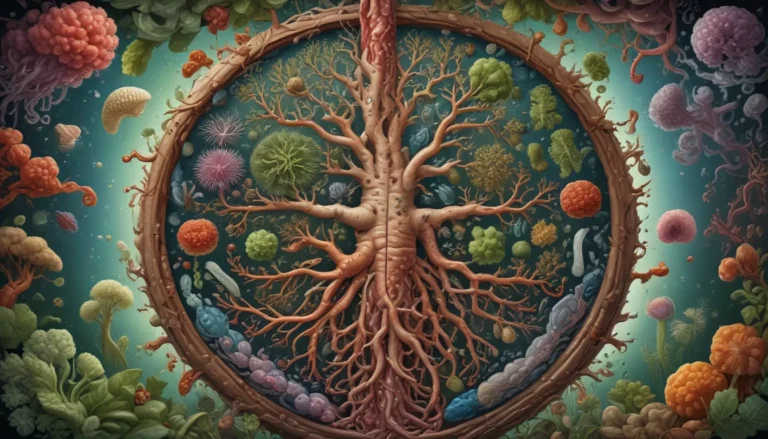A Note About Images: The images used in our articles are for illustration purposes only and may not exactly match the content. They are meant to engage readers, but the text should be relied upon for accurate information.
Have you ever wondered how our bodies remember and fight off dangerous pathogens? The answer lies in the incredible phenomenon of immune memory. Our immune system is a complex defense mechanism that protects us from diseases, and immune memory plays a crucial role in this process. In this article, we will delve into the world of immune memory and uncover 13 enigmatic facts that showcase its remarkable capabilities and significance. From understanding how our immune system retains information to exploring the long-lasting effects of vaccination, get ready to be amazed by the wonders of immune memory.
Unveiling the Mysteries of Immune Memory
- Immune memory helps our bodies remember and fight off germs faster and stronger, providing long-lasting protection against diseases.
- Immune memory can be acquired through natural infection or vaccination and is vital for vaccine effectiveness, keeping us healthy and protected.
The Key to Long-Lasting Protection
One of the most fascinating aspects of the immune system is its ability to remember past encounters with pathogens. Immune memory enables our bodies to mount a rapid and robust response upon re-exposure, offering long-lasting protection against infectious diseases.
The Role of Specialized Cells in Immune Memory
Immune memory is primarily maintained by two specialized cells: memory B cells and memory T cells. These cells are formed during the initial immune response and can persist in the body for years or even decades, playing a crucial role in protecting us against recurring infections.
The Specificity of Immune Memory
Each pathogen that our immune system encounters triggers a specific immune response. This specificity is preserved in memory cells, allowing the immune system to recognize and combat specific pathogens more efficiently in the future.
Acquiring Immune Memory Through Natural Means or Vaccination
Our immune system can develop memory responses through natural infection or vaccination. Both processes expose the immune system to pathogens or their components, leading to the production of memory cells that provide long-lasting protection.
The Lifelong Impact of Immune Memory
Once memory cells are generated, they can linger in the body for an extended period, offering ongoing protection against infections. Some memory cells can even last a lifetime, ensuring a durable defense against diseases.
Distinguishing Between Self and Non-Self
Our immune system has the remarkable ability to differentiate between the body’s own cells and foreign invaders. Memory cells are designed to target and eliminate pathogens while sparing healthy cells and tissues, safeguarding our overall health.
Transferring Immune Memory
In unique circumstances, immune memory can be transferred from one individual to another. This transfer can occur naturally, such as during pregnancy or through breastfeeding, or it can be artificially induced through the transfer of immune cells or antibodies.
Evolution of Immune Memory Over Time
Immune memory is not static and can evolve as new pathogens emerge or existing ones mutate. The immune system adapts its memory responses to recognize and combat these changes, ensuring continued protection against evolving threats.
Cross-Protection: A Phenomenon of Immune Memory
In some instances, memory responses against one pathogen can confer protection against related pathogens. This cross-protection occurs when memory cells recognize and respond to similar antigens present in different pathogens, enhancing our overall immune defense.
Boosting Immune Memory
By exposing our immune system to the same pathogen multiple times or through vaccinations, we can reinforce and strengthen immune memory. This process, known as boosting, enhances the protective capacity of the immune system, providing a robust defense against infections.
The Crucial Role of Immune Memory in Vaccine Effectiveness
Vaccines stimulate the immune system to generate memory responses against specific pathogens, enabling a rapid and strong immune response upon subsequent exposure. This leads to protection against diseases and underscores the importance of immune memory in vaccine efficacy.
Imperfections in Immune Memory
While immune memory offers significant protection, it is not foolproof. Some pathogens can evade or suppress the immune response, leading to breakthrough infections even in individuals with immune memory.
Advancing Our Understanding Through Immune Memory Research
Scientists are continuously studying immune memory to unravel its complexities and enhance our knowledge of the immune system. This research is pivotal in developing new vaccines, therapeutics, and strategies to combat infectious diseases.
Immune Memory: A Gateway to Health
Immune memory is a captivating and essential component of our immune system that enables us to recognize and combat pathogens effectively. Through memory cells and antibodies, our immune system retains vital information about past infections, empowering us to mount a swift and targeted response upon re-exposure. The significance of immune memory in vaccine development and disease prevention cannot be understated, highlighting its pivotal role in maintaining our health and well-being.
Frequently Asked Questions (FAQs)
-
What is immune memory?
Immune memory refers to the immune system’s ability to remember and respond more effectively to pathogens it has previously encountered. -
How does immune memory work?
Immune memory is maintained by memory cells that retain information about past infections. Upon re-exposure, these cells initiate a rapid and targeted immune response. -
Why is immune memory important?
Immune memory allows our bodies to combat recurring infections efficiently and forms the basis for vaccine effectiveness by stimulating the production of memory cells and antibodies. -
How long does immune memory last?
The duration of immune memory varies depending on the pathogen and individual factors, with some memories lasting a lifetime and others diminishing over time. -
Can immune memory be boosted?
Yes, immune memory can be boosted through methods like vaccination or re-exposure to pathogens, reinforcing the immune response and enhancing memory cell production. -
Can immune memory prevent all infections?
While immune memory provides significant protection, it is not infallible, and pathogens can evolve to evade the immune system’s memory response, leading to reinfection. -
Are some individuals better at developing immune memory?
Individual factors such as genetics, overall health, and previous pathogen exposure can influence the development and effectiveness of immune memory. -
Are there any side effects of immune memory?
Immune memory itself does not cause side effects, but the immune response triggered by memory cells and antibodies may lead to inflammation or allergic reactions in some cases. -
Can immune memory be transferred between individuals?
While immune memory transfer between individuals is not possible, it can be passed from a mother to her fetus during pregnancy through the placenta or breast milk. -
Can immune memory be manipulated for medical purposes?
Researchers are actively exploring ways to manipulate immune memory to enhance vaccines, therapies, and treatments for various diseases, promising significant advancements in the field of medicine.
Unveiling the Potential of Immune Memory
The captivating nature of immune memory leaves us desiring more knowledge. By unlocking the secrets of immune memory, we have the potential to revolutionize disease prevention and treatment. Through understanding the intricate workings of immune memory, we can harness its power to protect against a diverse range of pathogens. Let’s continue our exploration of the remarkable immune system and discover how it safeguards our health in an ever-evolving world.
Trust in Quality Content
Our dedication to providing accurate and engaging content drives our commitment to excellence. Each fact on our platform is contributed by real users like you, offering a diverse array of insights and information. Our diligent editors meticulously review each submission to ensure the highest standards of accuracy and reliability. Trust in our unwavering commitment to delivering quality and authenticity as you embark on your journey of discovery and learning with us.






